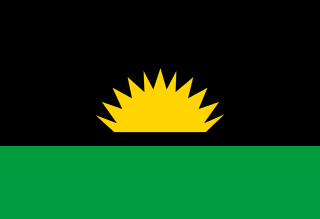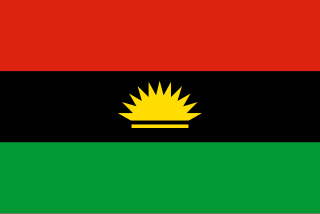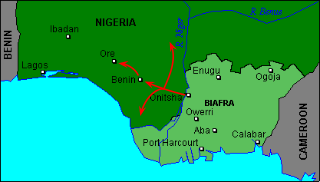
The Republic of Benin was a short-lived unrecognized secessionist state in West Africa that existed for seven hours in 1967. It was established on 19 September 1967 during the Nigerian Civil War as a puppet state of Biafra,following its occupation of Nigeria's Mid-Western Region,and named after its capital,Benin City,with Albert Nwazu Okonkwo as its head of government.

Chukwuemeka "Emeka" Odumegwu Ojukwu was a Nigerian military officer and politician who served as President of the Republic of Biafra from 1967 to 1970 during the Nigerian Civil War. He previously served as military governor of the Eastern Region of Nigeria,which he declared as the independent nation of Biafra. He was active as a politician from 1983 until his death in 2011 at the age of 78.

The Nigerian Civil War,also known as the Nigerian–Biafran War or the Biafran War,was a civil war fought between Nigeria and the Republic of Biafra,a secessionist state which had declared its independence from Nigeria in 1967. Nigeria was led by General Yakubu Gowon,while Biafra was led by Lieutenant Colonel Chukwuemeka "Emeka" Odumegwu Ojukwu. Biafra represented the nationalist aspirations of the Igbo ethnic group,whose leadership felt they could no longer coexist with the federal government dominated by the interests of the Muslim Hausa-Fulanis of Northern Nigeria. The conflict resulted from political,economic,ethnic,cultural and religious tensions which preceded the United Kingdom's formal decolonisation of Nigeria from 1960 to 1963. Immediate causes of the war in 1966 included a military coup,a counter-coup,and anti-Igbo pogroms in Northern Nigeria. Control over the lucrative oil production in the Niger Delta also played a vital strategic role,and was a factor in the strong French support for Biafra.

The flag of Biafra,used by the Republic of Biafra during the Nigerian Civil War (1967–1970),consists of a horizontal tricolour of red,black,and green,charged with a golden rising sun over a golden bar. The eleven rays of the sun represent the eleven former provinces of Biafra. The rays are typically long and slender with the lowest rays being nearly horizontal and the remaining rays spread evenly between.

Chief Dr. Emmanuel Chukwuemeka Iwuanyanwu is a Nigerian politician and businessman,considered one of the richest Igbo men in Nigeria.
Amorka is a town in the Ihiala government area of Anambra State of Nigeria. It is located along the Onitsha-Owerri Expressway,on the border of Mgbidi Imo Statė.
Ralph Uwazuruike is a Nigerian activist. He is the leader of the Movement for the Actualization of the Sovereign State of Biafra (MASSOB);a group canvassing for the secession and sovereignty of Eastern Nigeria. He holds degrees in Political Science from Punjab University,India,and Law from Bombay University,India. Uwazuruike adopts the principle of nonviolence as propagated by Mahatma Gandhi and Martin Luther King Jr.,as the philosophy of the struggle. He has been detained several times and charged with treason in Nigerian courts. On 28 April 2010,he was visited in prison by Chukwuemeka Odimegwu Ojukwu and his wife,Bianca.

The fall of Enugu was a military conflict between Nigerian and Biafran forces in September and October 1967 during the Nigerian Civil War which centered around Enugu,the capital of the secessionist Republic of Biafra. Nigerian federal forces had made Enugu's capture a priority shortly after war broke out,but their advance stalled at Nsukka. Biafran leader Odumegwu Ojukwu attempted to distract the Nigerian Army by initiating an invasion of Nigeria's Mid-Western Region in August,but the offensive was brought to a halt. Lieutenant Colonel Theophilus Danjuma took charge of the Nigerian forces at the Nsukka front and prepared to advance on Enugu with seven battalions of the 1st Division. Enugu was garrisoned by one brigade led by Colonel Alexander Madiebo and poorly armed civilians called into service. Danjuma decided to launch an offensive with his forces spread over a broad front to make it more difficult for the Biafrans to block them along major roads as had happened up to that point.
Operation Tail-Wind was the final military conflict between Nigeria and Biafra. The operation took place in the towns of Owerri and Uli,both of which were captured by Nigerian forces. The operation ended with General Odumegwu Ojukwu fleeing to the Ivory Coast and then president of Biafra Philip Effiong surrendering to Olusegun Obasanjo.

The Midwest Invasion of 1967 codenamed Operation Torch. was a military operation between Nigerian and Biafran military forces during the Nigerian Civil War. The invasion began on August 9 when 3,000 Biafran soldiers led by General Victor Banjo crossed the River Niger Bridge into Asaba. Upon reaching Agbor,the Biafrans split up. With the 12th Battalion moving west capturing Benin City and Ore,the 18th Battalion swung south,taking Warri,Sapele and Ughelli,while the 13th Battalion headed north for Auchi,Agenebode and Okene. Simultaneously,a plot to capture Mid-Western Governor David Ejoor at his home in Benin failed. Nevertheless,the Biafrans,meeting virtually no resistance,had seized the entire Mid-Western Region in less than 12 hours.
Operation Tiger Claw was a military conflict between Nigerian and Biafran military forces. The battle took place in the major port of Calabar. The Nigerian were led by Benjamin Adekunle while the Biafrans were led by Maj. Ogbo Oji. The aftermath was a major loss to the Biafrans because it cost the Biafrans one of their largest ports.
Akpan Utuk was a strategic and successful colonel in the Biafran Army.
Victor Adebukunola Banjo was a colonel in the Nigerian Army. He fought in the Biafran Army during the Nigerian Civil War. Banjo was accused of being a coup plotter against Nigerian Prime Minister Abubakar Tafawa Balewa by the government of Aguyi Ironsi. He was alleged to have staged a coup plot against Biafran President Odumegwu Ojukwu and was executed as a result. Ojukwu's first military judge stated that was not enough evidence to convict him of coup charges,but he was found guilty by a second military tribunal.
Timothy Onwuatuegwu was a Rebel Army Major and former Nigerian Army Major. He was a leading military figure in the Nigerian Civil War and a participant in the 1966 Nigerian coup d'etat.
Ogbugo Kalu was a former army officer who served in both the Nigerian Army and Biafran Army. Kalu was also commander of the Nigerian Military Training College (NMTC) in Kaduna following the 1966 Nigerian coup d'état.
Behind the Rising Sun is a 1971 war novel by Nigerian novelist and politician Sebastian Okechukwu Mezu. The novel was first published by Heinemann,and later reprinted in 1972 as part of the influential African Writers Series. The novel explores the events of the Nigerian Civil War. The novel is the first novel to deal with the war,following,and does so from a Biafran perspective. The novel suggests that the Nigerian victory in the war was not due to an aptitude by the Nigerian forces,but by the ineptitude of Baifran ability. Critic Wendy Griswald documents at least 28 novels that subsequently depict the conflict.

Igbo nationalism is a range of ethnic nationalist ideologies relating to the Igbo people of southeastern Nigeria. While the term is defined as seeking Igbo self-determination by some,others argue that it refers to the preservation and revival of Igbo culture and,for others,the development of Igboland stemming from the philosophy,Aku luo uno,which means "wealth builds the home".
Paschaline Alex Okoli is a Nigerian actress who played Cordelia in the sitcom Jenifa's Diary.
Alexander A. Madiebo was a Nigerian soldier. He served as the General Officer Commanding (GOC) of the Republic of Biafra which existed from 1967 to 1970.

![]() listen ) (born April 30,1941) is a Nigerian writer,scholar,philanthropist,and publisher. He was involved in politics in Nigeria in the late 1970s. [1]
listen ) (born April 30,1941) is a Nigerian writer,scholar,philanthropist,and publisher. He was involved in politics in Nigeria in the late 1970s. [1] 





